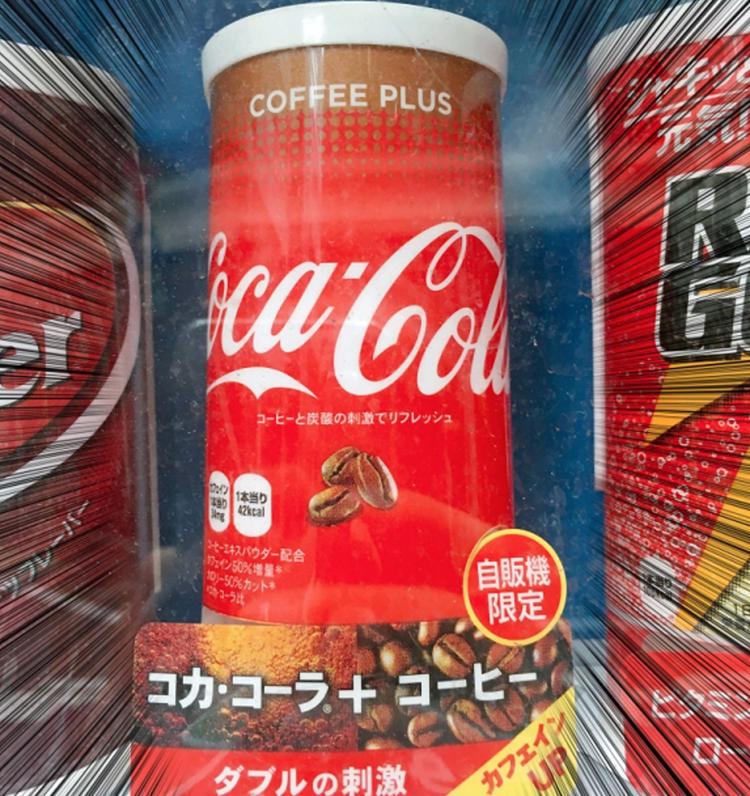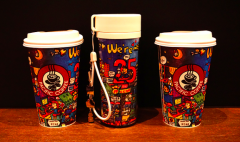Coca-Cola-flavored canned coffee appears in Japan. Would you like to be so High?

For professional baristas, please follow the coffee workshop (Wechat official account cafe_style)
The Japanese love coffee, but they are not so enthusiastic about cola.
In order to upgrade its refreshing effect, Coca-Cola launched a coffee-flavored Coke in the Japanese market this month.
The coffee cola, which contains 50% more caffeine than regular cola, is now available in vending machines in Japan (which is currently the only sales channel). It is mixed with a wide variety of beverages with a price tag of 130 yen, which is more expensive than ordinary small cans of carbonated drinks. But it does not deviate from the regular price of canned coffee.
The new cola has been tried and described as smelling more like coffee, and if you close your eyes and plug your ears (to avoid the rattling of carbonated drinks), you might think it's a cup of pure coffee.
If you remember, this year Coca-Cola launched a Coca-Cola Coca-Cola Plus in Japan that suppresses fat absorption. The name is similar to the new Coffee Coke. Coca-Cola Plus entered the market as a "licensed health food", sugar-free, calorie-free and added a source of dietary fiber. Coffee Coke is also moving closer to Coca-Cola Plus in terms of its health index, which contains half as many calories as regular Coke. Of course, its biggest selling point is not good for keeping fit, but a mixture of two exciting substances that stimulate the human cortex.
Coffee Coke, which is doubly excited, may also have something to do with the local people's love of coffee when it is launched in Japan. According to Inryou Souken, a beverage market research and consulting firm, instant coffee accounted for 20 per cent of the Japanese soft drink market in 2016, just 3 per cent less than instant tea, which ranked first.
Japan's developed convenience stores have made great contributions to the popularity of ready-to-drink coffee. Suntory, Fuyong, Parade, ASEED and other coffee brands are all complete, while Suntory is the best seller in ready-to-drink coffee, occupying 20% of the market share for several years in a row. In addition, Japan's overtime culture has also promoted coffee sales, after nightfall, office lights are the norm, urban white-collar workers gradually developed the habit of drinking a lot of coffee.
Last year, the market for instant, freshly ground and bottled coffee in Japan was about $7.3 billion, although it was only about half that of the United States, according to Euromonitor International. But given the maturity and population of their respective coffee markets, this figure is not small, compared with retail sales of only $1.624 billion for these three types of coffee in China.
Coke is not as important as coffee in Japan. Although Japan is Coca-Cola's second-largest market after the United States, with annual sales of more than $10 billion, and about half of the vending machines in Japan belong to Coca-Cola, the most popular Coca-Cola products in Japan are not carbonated drinks sold in the United States. Their favorites are Coca-Cola's sub-brands Georgia canned coffee and orange-flavored water and green tea.
In this way, it is a tricky way to use the coffee that the Japanese like as an introduction to encourage them to buy cola, but it is hard to say whether it will really be recognized.
Important Notice :
前街咖啡 FrontStreet Coffee has moved to new addredd:
FrontStreet Coffee Address: 315,Donghua East Road,GuangZhou
Tel:020 38364473
- Prev

Really good coffee not only helps you sleep, but also catches up with skin care products.
For professional baristas, please follow the coffee workshop (official Wechat account cafe_style). Some people say that drinking coffee before going to bed makes it exciting and difficult to fall asleep. But according to research, on the contrary, a really good cup of coffee can not only help sleep, but also its cosmetic effect and even catch up with skin care products, there are many benefits for women to drink coffee. If you want to taste a good cup of coffee, experts suggest
- Next

Pacific Coffee Pacific Coffee X Vitasoft beancurd jelly Coffee
Exchange of professional baristas, please follow the coffee workshop (Wechat official account cafe_style) Pacific Coffee to play crossover with Vitasoy on her 25th birthday to contribute to the craze of collective memories and childhood memories! Another city, Pacific Coffee, has recently taken on a new look. The shop has set up a wall of painted paper cups to display some of the works that have participated in the activities of colored paper cups.
Related
- Can lightly roasted coffee beans be used to extract espresso? How finely should you grind high-quality coffee beans to make Italian latte?
- What is the difference between the world's top rose summer coffee and Yejia Shefi? What are the flavor characteristics of Yega Shefi coffee and Panama rose summer?
- The ceremony is full! Starbucks starts to cut the ribbon at a complimentary coffee station?!
- A whole Michelin meal?! Lucky launches the new "Small Butter Apple Crispy Latte"
- Three tips for adjusting espresso on rainy days! Quickly find the right water temperature, powder, and grinding ratio for espresso!
- How much hot water does it take to brew hanging ear coffee? How does it taste best? Can hot water from the water dispenser be used to make ear drip coffee?
- What grade does Jamaica Blue Mountain No. 1 coffee belong to and how to drink it better? What is the highest grade of Blue Mountain coffee for coffee aristocrats?
- What are the flavor characteristics of the world-famous coffee Blue Mountain No. 1 Golden Mantelin? What are the characteristics of deep-roasted bitter coffee?
- Can I make coffee a second time in an Italian hand-brewed mocha pot? Why can't coffee be brewed several times like tea leaves?
- Hand-brewed coffee flows with a knife and a tornado. How to brew it? What is the proportion of grinding water and water temperature divided into?

